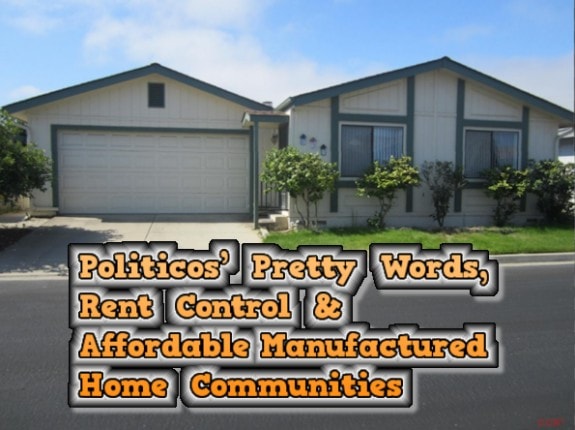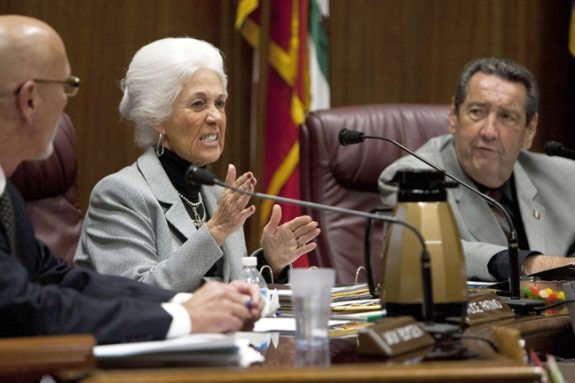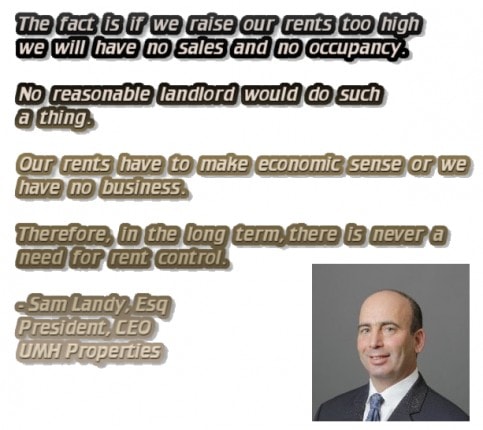
The Controversy – two sides of rent control – are found in what looked to be a political event at an ice cream social.
It began when the North Santa Barbara County Manufactured Homeowners Team (NSBMHT) gave congressional, state legislature and city council candidates a chance to talk about their stance on major issues – including manufactured home communities – at an ice cream social on September 12, reports the Santa Maria Times.
The event, co-hosted by the Casa Grande Homeowners Association at the organization’s clubhouse, allowed politicians like Salud Carbajal, First District Santa Barbara County supervisor and Democratic candidate for the 24th Congressional District, the opportunity to share what he views as his longstanding history of support of manufactured homeowners to more than 60 attendees.
Carbajal mentioned the conversion protection ordinance passed in 2012 for manufactured homeowners in Santa Barbara County, and that he’s always favored the affordable manufactured homes and rent control ordinances that exist in the county.

“I believe manufactured homes should continue to have rent control,” Carbajal told the crowd. “Rent control can afford manufactured homeowners the security from that fear they are facing every day that someone is going to sell your park and not give you notice and worry about displacing you.”

Nineteenth District California State seat Democratic incumbent Hannah-Beth Jackson was also in attendance. Jackson shared the legislation she helped pass that provides protection to mobile and manufactured home owners if a landowner tries to sell the land where their home is. If most of the land’s residents object to the sale, this legislation lets local government intervene and stop the transaction.
“Housing is a right,” Jackson said at the event. “We are all entitled to a decent place to live. Mobile home ownership for many, many people is the last opportunity to own a home or stay off the streets.”
Santa Maria incumbent mayor Alice M. Patino discussed the city’s current ordinances to help protect pre-HUD Code mobile home owners, manufactured home owners and community owners. While some developer could go through California and purchase MH communities for conversion to other uses, he or she would be stopped from doing so in Santa Maria, the mayor said. Patino expressed her desire to be re-elected as mayor to continue the work she and the council have started.
“We have seen the economy take a downturn, but since that we have seen policies in the city of Santa Maria where we are encouraging businesses,” Patino told the crowd.
Perhaps Patino didn’t realize the economic and political irony of her statement?

Ice Cream Social, Politicos and Harming the Free Market
One of the challenges facing the manufactured housing industry in general, and manufactured home communities in this particular case, is how ignoring the laws of supply and demand – the operation of a free market – often harms the very affordability for which candidates’ advocate.
“When unreasonable price controls are placed on articles of immediate consumption, like bread, for example, the bakers can simply refuse to continue to bake and sell it,” wrote Henry Hazlitt, in Economics in One Lesson, The Lesson Applied – What Rent Control Does. “A [bread] shortage becomes immediately obvious, and the politicians are compelled to raise the ceilings or repeal them.”
“But housing is very durable,” stated Hazlitt. “It may take several years before tenants begin to feel the results of the discouragement to new building, and to ordinary maintenance and repair. It may take even longer before they realize that the scarcity and deterioration of housing is directly traceable to rent control.”

What Hazlitt described is at the heart of the good intentions gone astray that occurs so often in modern politics at the local, state and federal levels.
When it comes to manufactured home communities (MHCs), instead of Hazlitt’s example of bread makers not baking more bread – in the case of MHCs, it drives out new construction. That over time will tend to drive up the prices of existing communities. Site fees for residents rise, as competition is decreased. And thus the very people the rent control laws are intended to “help,” are in fact slowly, over time, harmed.
This in turn explains, in part, the lack of new MH communities being constructed. Why would investors risk the high costs involved in creating a community, the infill time needed to make a community profitable, if politicians later come in with rent control and make obtaining a profit difficult or impossible?

Another factor, of course, is NIMBY – not in my back yard – when it comes to the creation of affordable housing that features manufactured homes, as the recent story out of Texas linked here reflects.

Back at the Ice Cream Social at Casa Grande Mobile Home Park Clubhouse in Santa Maria…
“I have no problem with someone trying to make an honest return on their money but not at the expense of a very unique demographic in our community,” Cordero said at the event in regards to community owners who want to sell their properties.
Other Santa Maria City Council candidates who attended the event included former Santa Maria planning commissioner Michael Moats, businessman Hector Sanchez, Mary Hernandez (representing her husband candidate Ed Hernandez who couldn’t attend) and incumbent Terri Zuniga.

Speaking about a somewhat similar story on the opposite coast, “…this news story out of Dover, DE is yet another example of blatant agenda and discrimination against our industry. More importantly, this is discrimination against affordable housing and the individuals who live in manufactured or pre-fabricated homes,” Brad Nelms of ManufacturedHomes.com told MHProNews.
“If anything,” Nelms said, “this Dover zoning/MHC story is a case of officials harming their own constituents. Rent control is proven not to work, save to drive out more affordable housing over time.”
Nelms was echoing the point in Hazlitt’s economic principle in regards to rent control, as noted above. But that point stands in contrast to what the attendees at the ice cream social believe.
“My record on the City Council shows I’m for affordable housing,” Zuniga said. “I have asked that large residential developers, whether they are multi-family developments or single-family developments, allocate a portion for affordable housing. I haven’t been successful yet, but I think that is critical.”
Why hasn’t Zuniga been successful? Could it be that ignorning the law of supply and demand has thwarted the very thing he claims to support?
And so the political struggles and economic tensions over rent control and the spread of the affordable housing crisis and its impact on manufactured homes and land-lease communities continues. ##
(Update 9-14-2016 @ 3:36 PM ET – see the related letter to the editor from a respected, successful and well known MH Community CEO, linked here.)
(Editor’s Notes: the quote from Brad Nelms was taken from his recent commentary, Discrimination, Injustice against manufactured housing – a Call for Action by Industry Professionals, linked here. For the download of Hazlitt’s chapter on rent control, quoted above, click here.)
(Image Credits as shown.)

Submitted by Joe Dyton to the Daily Business News, MHProNews.com.

























